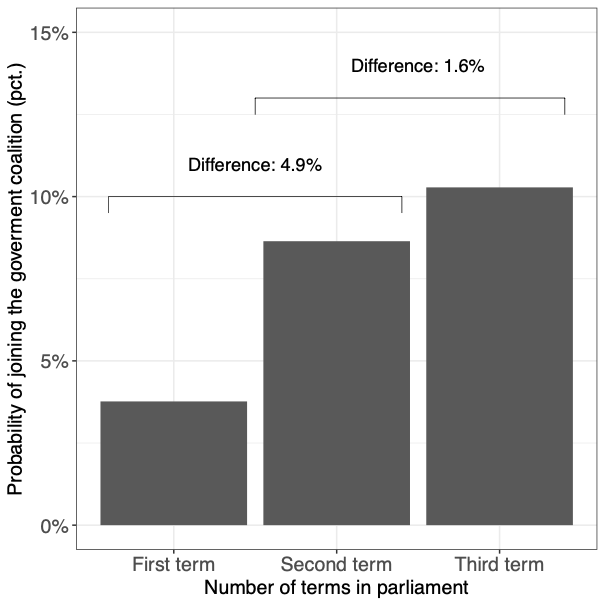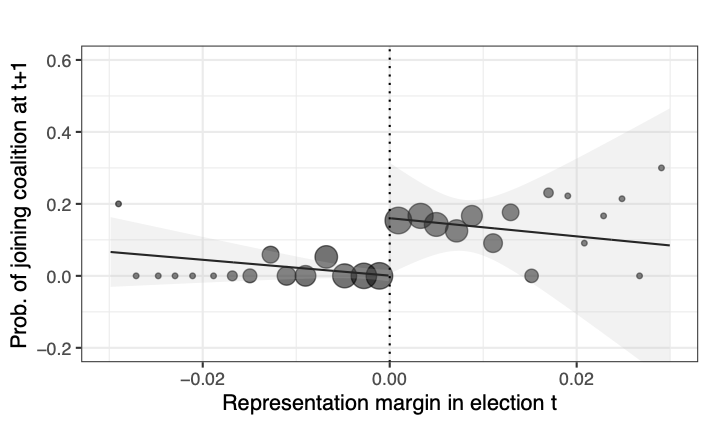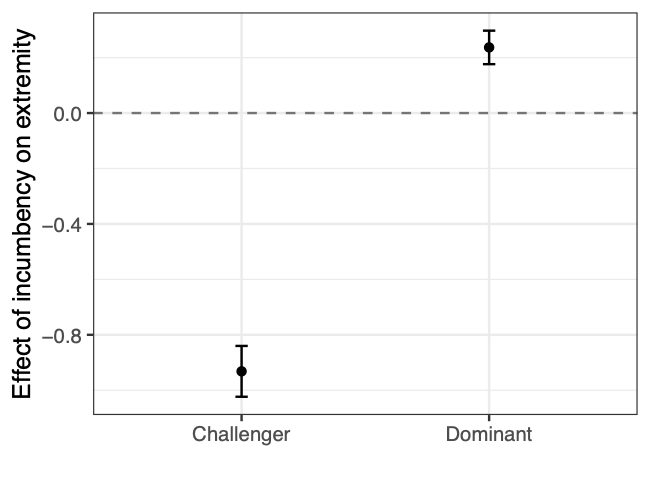In recent years, challenger parties—political groups without experience in government—have disrupted party systems across Europe, often gaining significant voter support by positioning themselves as anti-establishment outsiders. While some of these parties, like Finland’s Finns Party or Greece’s Syriza, eventually find their way into government coalitions, moving from parliament seats to ministerial positions remains unclear. Our new article focuses on whether holding legislative office increases the likelihood of challenger parties entering government. And if so, why?
Cross-country evidence: incumbency and government participation
For a first look at the question, we examine incumbency and government participation for challenger parties in national-level data from 19 Western European countries from 1950 to 2017. Our analysis is summarized in Figure 1.

Figure 1.
As shown, challenger parties rarely enter government immediately after gaining parliamentary representation. However, their probability of joining a governing coalition roughly doubles after holding legislative seats for one term. This cross-country analysis supports our theory that legislative incumbency is crucial in facilitating challenger parties’ entry into government.
However, this cross-sectional association may not reflect a causal relationship: incumbent challenger parties may differ from non-incumbents in many ways. To isolate the causal effect of incumbency, we turn to a subnational context where we can implement a stronger research design.
Legislative Experience boosts government participation for challenger parties
We study local governments in Denmark, drawing on data from over 2,500 local elections and more than 15,000 committee assignments across municipalities. To identify the causal effect of legislative incumbency, we use a regression discontinuity design that compares parties that just secure representation in the municipal council to those that narrowly fall short. Our main finding is shown in Figure 2.

Figure 2.
We find strong evidence that legislative incumbency significantly increases challenger parties’ chances of joining government coalitions. The effect is large: on average, challenger parties securing representation are nearly 20 percentage points more likely to be included in local governments in subsequent elections compared to those just below the threshold.
We also show that this incumbency effect is unique to challenger parties. Established (dominant) parties experience no comparable boost in government participation from merely holding office.
Inclusion and Moderation
Next, we explore why incumbency has such a strong effect for challenger parties. Using detailed candidate survey data from Danish local elections, we test whether holding office makes these parties more moderate and thus more acceptable as coalition partners to mainstream parties. Figure 3 presents our results.
The results strongly support moderation as the key mechanism. Challenger parties with legislative experience adopt positions significantly closer to the political center, moving away from their initially extreme stances (left panel). Furthermore, the language used in their platforms becomes more similar to mainstream parties, as evidenced by the fact that challenger parties are less likely to be correctly predicted as such based on word use (right panel). In other words, our results suggest that incumbency transforms radical outsiders into viable coalition partners by moderating their policies and rhetoric.


Figure 3.
A Centripital Force
Our findings have important implications for how we should think about the emergence of challenger parties. They suggest a ‘centripetal’ dynamic in which new challenger parties emerge at political extremes, moderate upon gaining elected experience, and eventually integrate into mainstream politics, leaving room for new challengers to emerge at the fringes. This ongoing centripetal force shapes the political landscape in parliamentary democracies.
Our findings may also potentially caution against efforts to exclude challenger parties from the legislative arena. Enabling these parties to engage in politics within elected bodies may, counterintuitively, promote stability by moderating their initially extreme positions. At the same time, mainstreaming can also alienate anti-establishment voters, who may come to see the system as rigged and respond by demanding ever more radical forms of opposition. This dynamic highlights a core tension in democratic systems between integration and representation.
Author
Frederik Hjorth, Martin Vinæs Larsen, and Jacob Nyrup
Frederik Hjorth is an Associate Professor at University of Copenhagen. He studies elections, representation, and competition between mainstream and extreme parties, often with the use of computational methods.
Martin Vinæs Larsen is an Associate Professor at Aarhus University. He studies the politics of housing and spatial inequality, as well as democratic representation and political accountability in local governments.
Jacob Nyrup is an Associate Professor at University of Oslo. He studies political elites, authoritarian regimes, wealth inequality and its effects, and Danish local politics.

